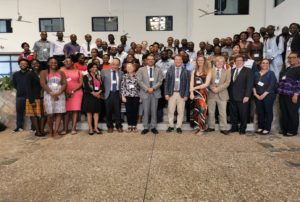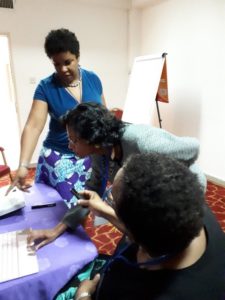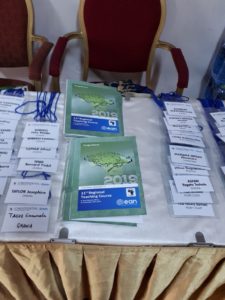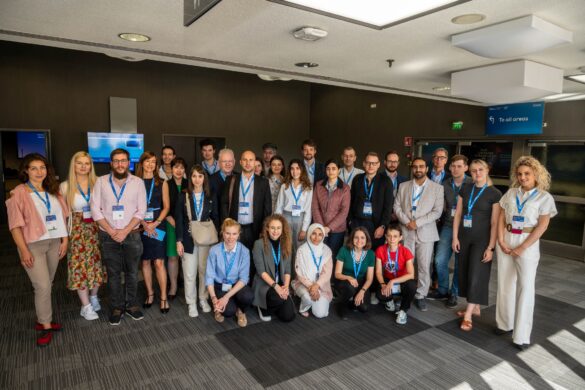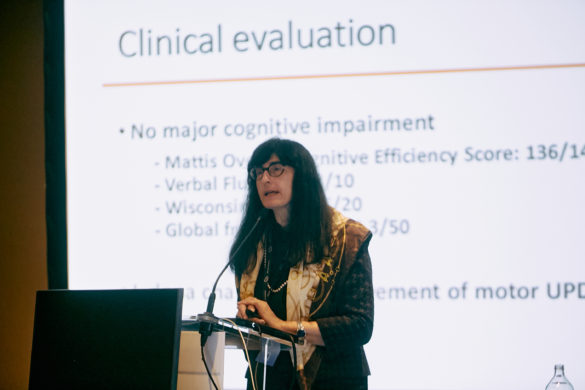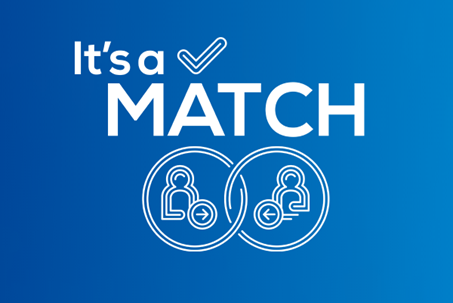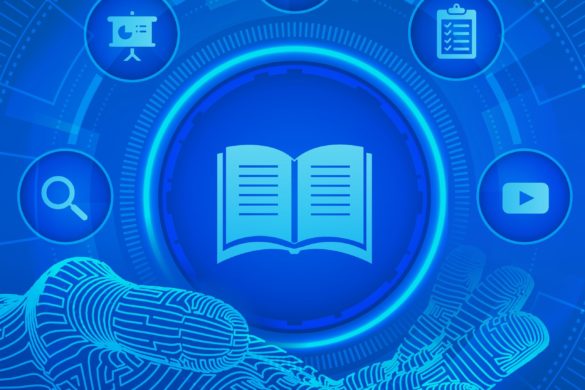The 11th Regional Teaching Course (RTC) in sub-Saharan Africa (SSA) took place in Accra, Ghana. Dr. A. Charway Felli, President-elect of AFAN hosted the RTC held at the Ghana College of Physicians and Surgeons.
80 Residents took part in this RTC representing 20 SSA countries.
The RTC’s overarching theme “Neurology across the lifespan” addressed the following topics:
- Neuropathies and Myopathies
- Neuro-infections
- Electro-neurophysiology
- Headaches
Dr. Henry Lawson, Vice-Rector of the Ghana College of Physicians and Surgeons, opened the works.
He welcomed all to Ghana and expressed his and the Dean’s appreciation to host this educational event. Dr Lawson stressed the importance to study the complexity of neurological diseases. He conveyed best wishes for a successful RTC on behalf of the Director of the College, Prof. Dr. Jacob Plange-Rhule presently abroad.
Prof. Foad Abd-allah, President of AFAN and WSO delegate illustrated AFANs involvement in education and the RTC. Prof. Riadh Gouider, WFN Trustee, brought wishes of Prof. William Carroll, WFN President. He gave an overview of WFN’s educational opportunities and involvement in Africa. Prof. Claudio Bassetti, EAN President-elect, confirmed EAN’s commitment to continue its involvement in this educational initiative in SSA in close cooperation with AFAN. He especially thanked all scientific societies who made this RTC possible.
The scientific programme started with the topic “Neuropathies and Myopathies” chaired by Prof. Erich Schmutzhard, Austria/EAN and Dr. Augustina Charway-Felli, Ghana/AFAN.
Claudio Bassetti, Switzerland, president-elect EAN, opened the lectures with the basic topic: How to examine the elderly patient; a practical approach and pitfalls. His presentation – concentrating on the best possible structured approach to an elderly patient – was extremely well received, drew many questions and indicated the high interest of the participants. They kept reiterating how important such a topic for their daily work is which such an outstanding teacher presented in such a practically useful way.
Joanne Wilmshurst, South Africa, President ICNA – International Child Neurology Association presented in her lecture on “Polyneuropathies and myopathies in SSA children“. The vast field of these diseases in the sub-Saharan setting, suggested the best possible diagnostic algorithms for such suspected cases, both clinically and with ancillary tests, stressed the fast growing importance of basic genetic knowledge and diagnostic procedures even in the sub-Saharan setting and concluded with clear and distinct management proposals of such patients in the sub-Saharan context.
Augustina Charway Felli, Ghana, AFAN, presented in her lecture on “Polyneuropathies and myopathies in SSA adults and elderly patients“ the vast array of these diseases in the sub-Saharan setting. In accordance with Joanne Wilmshurst, she presented a beautifully structured algorithm for adults and elderly patients, in the order of SSA-importance. She concluded with neurogenetics – what should be done, what can be done – and terminated her lecture with realistically and best possible management strategies of SSA adults and elderly patients with neuropathies or myopathies.
During the Clinical Grand Round discussion led by Prof. Claudio Bassetti and Prof. Joanne Wilmshurst, residents presented and discussed their selected cases.
Presentations were made by:
- Dr. Amadou Abdou Bacharou (Burkina Faso)
- Dr. Samuel N. Yeo (Ivory Coast)
- Dr. Nana Yaa Kyei-Frimpong (Ghana)
The residents were divided into 4 rotating break out groups, and the afternoon was dedicated to clinical case discussions brought by the residents and the faculty. Each group addressed one of the four topics of the RTC chaired by the faculty. They would rotate over the four days of the RTC and work on a different topic each day.
Each day ended with a MC test on the day’s teaching assessing its benefit.
“Neuroinfections” were the topic of Day two of the RTC. Prof. Erich Schmutzhard and Prof. Njideka Okubadejo, Nigeria/MDS chaired the session.
Ebenezer Badoe, Ghana, and Erich Schmutzhard, EAN, Austria, started the morning with their lectures on „Infections of the CNS in SSA children and adolescents“ and „Adults and the elderly in SSA“. Beside an overview of the current knowledge of potential infections and infectious agents threatening African children, adolescents, adults and the elderly – cerebral malaria, acute bacterial meningitis, viral encephalitis, chronic meningitis including neuro-tuberculosis, myelitis and poliomyelitis – much emphasis was laid upon the changing epidemiology of these infectious CNS diseases, and the pertinent implications on the daily diagnostic and therapeutic work in SSA. The most important take home messages were intensely discussed and presented as ‘easily remembered bullet points’ (quote by an Ivorian resident).
Njideka Okubadejo, MDS, Nigeria, gave an excellent overview on infectious and para-/post-infectious diseases causing a wide variety of movement disorders. She highly successfully aroused – and stimulated – the interest of the residents when she elegantly linked the clinico-neurological syndrome to the specific etiological agents, pathophysiological processes and neuroradiological findings and images respectively. She concluded with highly practical recommendations on further diagnostics and therapeutic management of such patient.
Riadh Gouider, WFN, Tunisia, undertook highly successfully the immense task to give an overview of systemic infections, CNS infections and infectious agents causing ischemic and/or hemorrhagic stroke. The presentation covered meningo-vascular syphilis, acute bacterial meningitis, viral meningo-vasculitis, CNS tuberculosis, fungal and parasitic infections (e.g. neurocysticercosis) up to septic sinus thrombosis and infective endocarditis with septic embolism.
During the Clinical Grand Round discussion chaired by Prof. Ebenezer Badoe and Prof. Joanne Wilmshurst, residents presented and discussed their selected cases.
Presentations were made by:
- Dr. Assata Sylla (Ivory Coast)
- Dr. Deise Haua da Silva Catamo (Mozambique)
- Dr. Mashina Chomba (Zambia)
In the evening of day 2 of the RTC a dinner and interactive video session was organised at the Airport View Hotel. Prof. Claudio Bassetti, Prof. L. Tucker and Prof Steven Lewis showed and discussed video cases with the participants.
The videos were related to:
- Peripheral nerve lesions
- Movement disorders
- Epilepsies and seizures
The evening ended with cheers for Prof. Erich Schmutzhard’s birthday and a dance!
Day three addressed “Electro-neurophysiology”. Prof. Rufus Akinyemi, Nigeria/IBRO, and Prof. Albert Akaplu, Ghana, chaired the morning session.
Rufus Akinyemi, IBRO, Nigeria, discussed in his lecture the rapidly growing issue – also and particularly important in the SSA population – of cognitive impairment, various forms of dementias and concentrated mainly on clinical presentations and ancillary tests possible and required in such patients in the SSA context (what can be done – what should be done).
Lawrence Tucker, AFAN, South Africa, drew extremely high attention when he presented his lecture on electroencephalography in SSA. He limited this vast field very elegantly to the basics of EEG in diagnosing and managing SSA patients with seizures, epilepsy and various forms of impaired consciousness. It rapidly became clear that he is an experienced teacher in this field with a huge body of knowledge and practical experience and he shared very elegantly this his knowledge and experience with the audience.
Pushpa Narayanaswami, AAN, USA, excited the audience with her lecture on ancillary tests in neuro- and myopathies. This lecture was full of many practical examples showing their clinical importance and, at the same time, the absolute necessity to interpret EMG, NCV findings within the clinical/neurological context and this specifically in a low – and middle-income setting. The residents were highly impressed how much the neurological examination, including the appropriate history taking, can achieve and when such an ancillary test – which virtually always needs to be paid for privately in SSA hospitals – is essential or not.
Albert Akpalu, Ghana, addressed the issue of spinal cord diseases, their clinical presentation, the potentially necessary emergency management and the role of ancillary testing in such diseases as spinal cord injury, transverse and poliomyelitis, NMO spectrum disorders or extra axial space-occupying lesions.
During the Clinical Grand Round discussion chaired by Prof Pushpa Narayanaswami and Prof Erich Schmutzhard, residents presented and discussed their selected cases.
Presentations were made by:
- Dr. Mahamoudou Loure (Burkina Faso)
- Dr. Freda Dodd-Glover (Ghana)
- Dr. Nfwama Kawatu (Zambia)
This third day was concluded by a 90 minutes ‘seminar’ on career development. Steven Lewis, WFN, USA, and Pushpa Narayanaswami, AAN, USA, presented in an exciting and enticing way how a SSA resident should and can approach the task of writing an abstract, preparing and submitting a paper and writing up a grant application. All agreed that an academic career – many of the residents are on this track – needs exactly these skills to be pursued successfully. Both lecturers gave many positive advices, pointed to many potential pitfalls and encouraged the entire audience to pursue this track and not to give up after one or even a few rejections
Day four of the RTC addressed “Headaches”. Prof. Lawrence Tucker and Prof. Ebenezer Badoe chaired the session.
Ebenezer Badoe, Ghana and David Garcia Azorin, EAN, Spain, gave excellent lectures on primary headaches in SSA children/adolescents and adults, respectively. It was an immense task, which both lecturers managed successfully when they discussed typical issues of history, clinical/neurological presentation and the potential need or absence of need for adjunctive diagnostic procedures. Both concluded with therapeutic management and possible preventive strategies in the SSA setting. They also discussed the rapid development of therapeutic strategies in various forms of headache, as migraine, TTH or cluster headache.
Foad Abdallah, president of AFAN, Egypt, undertook the immense task to discuss the issue of acute first ever headache, concentrating on vascular causes. He transported very efficiently his message not to miss such a single case of, e.g. SAH, sentinel headache in SAH, ICH, ischemic stroke or sinus/venous thrombosis. He supplemented his profound lecture with exciting and dramatic cases underlining his message that such secondary headaches / first ever vascular headaches never be missed to avoid catastrophic evolution of the disease.
Prof. Abd-Allah Foad and Dr. David Garcia Azorin chaired the day four Clinical Grand Rounds. The following residents presented selected cases.
Presentations were made by:
- Dr. Hilina Dagnachew (Ethiopia)
- Dr. Nozibongo Ndazamela Voxeka (South Africa)
In all lectures, the video-session, career development session, clinical grand rounds and case presentations the discussion was very vivid indicating both the vast body of knowledge of the faculty, partially also of the participants and – even more – the eagerness and ‘thirst’ to learn as much as possible in these ‘precious’ four days (quote by a resident from Ethiopia).
Delegates of the RTC supporting scientific societies took part in the RTC’s closing session.
All expressed their appreciation of the work done by the residents and fellow faculty members.
On behalf of their organisations, they pledged support for future RTCs.
Special thanks were given to Dr. Charway Felli for the fine hospitality at the Ghana College of Physicians and Surgeons and the splendid work.

